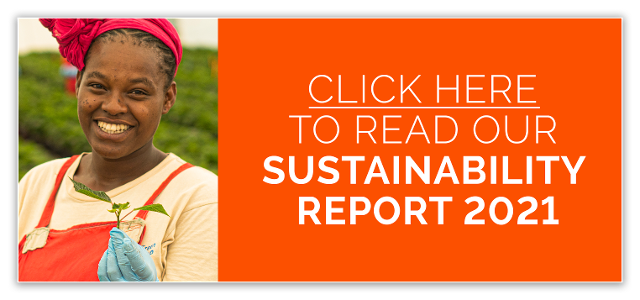Sustainability report provides transparency and accountability for actions
Dümmen Orange’s sustainability report provides transparency and accountability for its actions
Dümmen Orange published its very first Environmental, Social & Governance (ESG) Report, which offers an overview of the company’s sustainability journey and provides a greater level of transparency and accountability for its actions. “This report demonstrates our mission to be a leading, global ornamental horticulture company,” says Hugo Noordhoek Hegt, CEO. “We know that this cannot be done without careful consideration of our environmental footprint, and our impact on our employees and on those with whom we work closely.”
Not a matter of ‘decided today, settled tomorrow’
The report zooms-in on Dümmen Orange’s three sustainability focus areas: environment, people and technology. Hugo Noordhoek Hegt: “Sustainability considerations are a factor in our decision-making process. Our purpose is to make a difference now and to see relevant change for the future, not only as a company ourselves, but also across the entire industry. This is not a matter of ‘decided today, settled tomorrow’ and I am the first to admit – or clarify, actually – that this is a journey. Focus is needed to move forward. In the area of environment, for instance, we decided to focus on minimizing chemical crop protection, recycling and reducing waste, managing water impact, and embracing carbon neutral horticulture.”
Dümmen Orange actively works toward reducing its carbon footprint and ultimately becoming carbon neutral. “Our goal is to reduce our carbon footprint by 50% in 2030,” says Hugo Noordhoek Hegt. “Knowing our current position is the first step in achieving this goal. That’s why we mapped out our carbon footprint at a number of production sites in the Netherlands, Kenya and Guatemala. We have identified our environmental impact, from production on site to the airport in the destination country. The next step is to reduce the footprint where possible, for example by working more closely with suppliers or by making different and better choices, such as shortening transport routes and cutting energy consumption.”
Taking care of employees and communities
Dümmen Orange’s social priorities are employee engagement, health and safety, and human rights. Ellen Lakeman, Chief Human Resources Officer: “For us, sustainability means that we are taking care of our employees and our communities, developing them, and also doing the right thing to ensure their happiness and success.”
As a Board Member of the International Responsible Business Conduct agreement (IRBC), Dümmen Orange has been involved in a pilot on living wages. Although the pilot was conducted only in Kenya, Uganda and Ethiopia, the company has taken this opportunity to evaluate the living wages at all farm locations around the world. Ellen Lakeman: “We are proud to confirm that besides the fact that our basic salaries are all above UN guidelines, we also provide many additional benefits like medical care, food, education and in some countries also housing and child care.”
Developing varieties that support sustainability mission
With its Breeding Technology Center in the Netherlands, the largest breeding laboratory in the world for ornamental crops, Dümmen Orange is well-positioned to drive sustainability through technological developments. Hans van den Heuvel, Managing Director R&D: “Advanced technology enables us to breed and propagate ornamentals which have more desirable traits at the source of the value chain, and thereby playing a role in improving sustainability throughout this value chain. Our Intrinsa plants, for instance, leverage natural genetics for better plant performance and advanced disease resistance, and therefore need less chemical protection. This allows for more sustainable and economical crops in the future. The combination of advanced hybridization techniques and traditional breeding creates economically viable plants for a greener future. The innovative technology we are harnessing at Dümmen Orange is really exciting and challenging, and as a leading breeder we are committed to making ornamentals more sustainable. We’re taking ornamental horticulture to the next level.”
